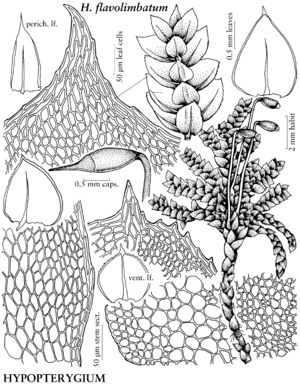Hypopterygiaceae
Plants medium-sized to large, in mats. Stems brownish, primary-stem stoloniform, creeping, secondary stems dendroid, much-branched, branches complanate-foliate, dorsiventral; hyalodermis and sclerodermis not differentiated, central strand strong. Leaves dimorphic; dorsal or lateral leaves larger, in 2 rows, somewhat asymmetric, ventral leaves smaller, symmetric; leaves ovate to very short-acuminate [oblong or lingulate]; margins entire to dentate [serrulate], not ciliate [occasionally ciliate]; costa single, subpercurrent; laminal cells smooth [1-papillose]. Sexual condition autoicous [dioicous or heteroicous]. Seta elongate [short], straight or curved, smooth or weakly papillose distally. Capsule horizontal [usually inclined], cylindric [subglobose, ovoid]; operculum rostrate; peristome teeth 16, double [exostome occasionally absent]; exostome cross-striolate, furrowed medially or with zigzag line, trabeculae well developed; endostome cilia well developed or absent. Calyptra cucullate or conic-cucullate [mitrate].
Distribution
Nearly worldwide, apparently in Europe, tropical and warm temperate regions
Discussion
Genera 4, species ca. 70 (1 genus, 2 species in the flora).
Selected References
None.
